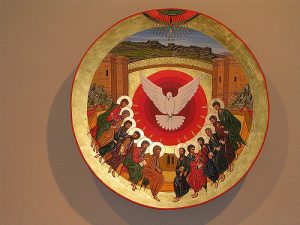HOMILY EASTER SUNDAY 6 – C
What Would Jesus Do?
(Acts 15:1-2, 22-29; Psalm 67; Rev 21:10-14, 22-23; John 14:23-29)
******************************************************************
Some time back, bracelets with the letters WWJD were quite popular. The letters, of course, stand for What Would Jesus Do?
That is actually much more than just a catchy phrase on a bracelet. There is a wealth of wisdom in asking ourselves that question in any difficult situation in life.
The readings today suggest what Jesus would have us do is keep his Word and live in His Spirit.
 That question was actually facing the early church leaders as they struggled through their first crisis: what would gentiles have to do to become followers of Jesus? Would they need to be circumcised? They resorted to gathering together in council and praying to find the right answer. Their solution was made “with the Holy Spirit.” There was a sense that the Spirit of Jesus was guiding them, letting them know what Jesus would do, in charting a course into this unknown territory as the church was beginning to spread.
That question was actually facing the early church leaders as they struggled through their first crisis: what would gentiles have to do to become followers of Jesus? Would they need to be circumcised? They resorted to gathering together in council and praying to find the right answer. Their solution was made “with the Holy Spirit.” There was a sense that the Spirit of Jesus was guiding them, letting them know what Jesus would do, in charting a course into this unknown territory as the church was beginning to spread.
This passage from the Acts of the Apostles is the basis for the way the church throughout the ages has functioned – relying both on the lived word of God (Tradition) and the written Word of God (Scripture) Even some of our non-Catholic friends are beginning to see that Luther’s famous saying “Scripture alone,” is not found in Scripture. What is found there is what we see today – the church leaders gathering in prayer, guided by the Spirit, making decisions that eventually make up the Tradition of the church.
From the Gospel it is obvious Jesus wants us to walk in an intimate, loving relationship with God as Father, Son and Holy Spirit. We are to pray to the Father, focus on His Word, and live in the Spirit. It is here we realize the revolutionary new vision of God Jesus offers us – an intimate, in-dwelling God whose Spirit guides, inspires and informs us from within.
The second part of this revelation is that we are to express our relationship with this loving God by loving one another. To keep the Word of Jesus is to keep the Great Commandment he gave us: love God with our whole being, but also and just as important, love one another as he has loved us, to the extent of loving even our enemies as he did. That is expressed especially through forgiveness, which is the hallmark and lifeblood of the church.
In the end, we are being called to realize, to the extent that we can, the new heavenly Jerusalem of the second reading, in our lives here and now. This is called “realized eschatology,” the making present now what we will be experiencing when Jesus comes again.
The following possibly true short story captures the spirit of this ideal. Three men running to catch a subway train knock over the fruit stand of street vendor. Two of the men brush themselves off and keep on going. The other stops to help put up stand. It turns out that the vendor is blind boy, who finally asks the man who stopped, “Are you Jesus?”
The Eucharist is a miracle of the power of the Spirit; it makes present the love of God Jesus showed on the cross; it is an intimate meal in which God gives us himself to us, and transforms us into the Body of Christ, sent to love the whole world.
So, what would Jesus do? Even more important, what would Jesus have us do? He would have us keep his Word and live in His Spirit.



